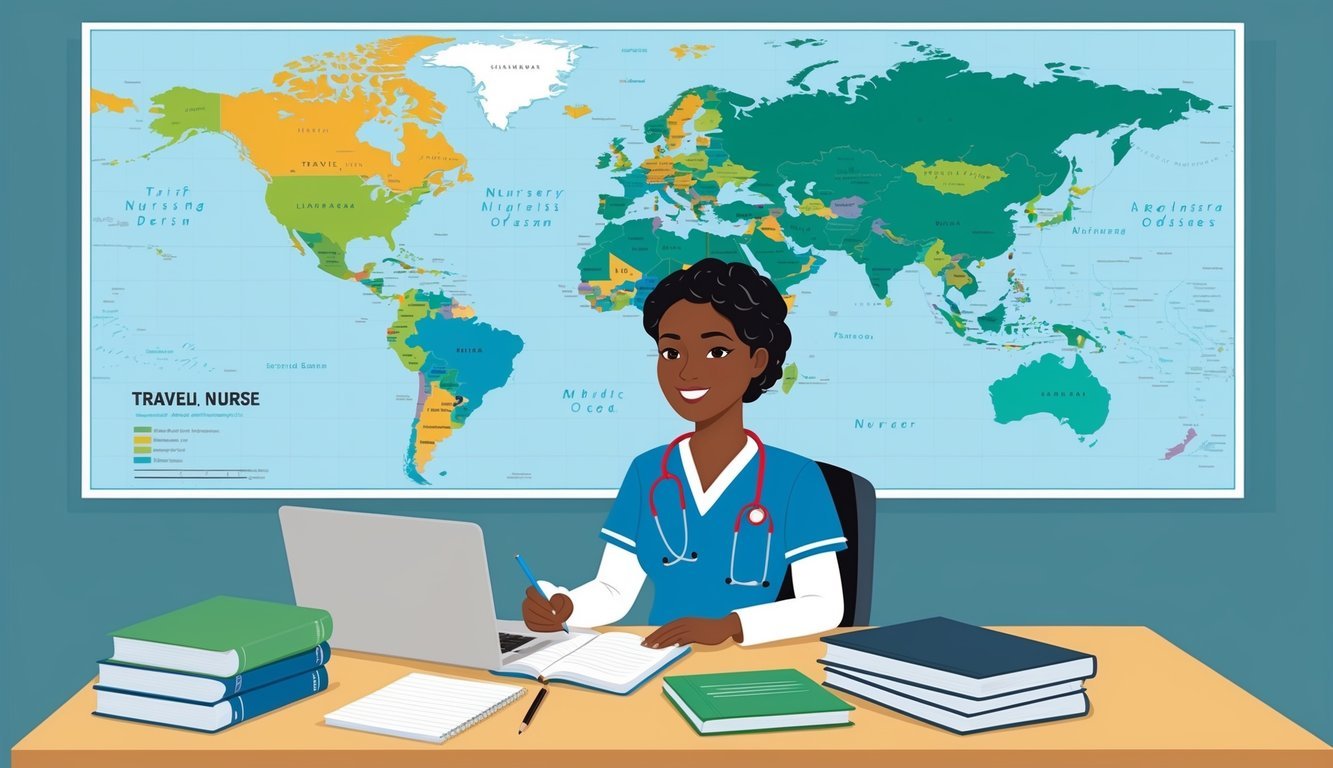Becoming a travel nurse offers a unique blend of adventure and a rewarding career in healthcare. To embark on this journey, you need a solid education foundation, starting with becoming a registered nurse. This usually involves completing an accredited nursing program and passing the NCLEX-RN exam to obtain your nursing license.
Once you have these qualifications, you can explore travel nursing opportunities that suit your goals.
Many travel nurses work with staffing agencies that help place them in various healthcare facilities across the country.
As a travel nurse, you’ll not only gain valuable experience in different clinical settings but also enjoy the chance to travel and explore new places.
With the right certifications and skills, you can unlock higher earning potential while enjoying the flexibility that comes with travel nursing.
Before diving in, understanding the requirements and the employment landscape is essential.
The world of travel nursing is vast, filled with benefits, challenges, and the potential for a fulfilling career.
Key Takeaways
- You need to become a licensed registered nurse to start your travel nursing career.
- Travel nurses can work in diverse locations, gaining experience and financial benefits.
- Researching the requirements and opportunities is key to successful travel nursing.
Education Pathways to Become a Travel Nurse

To become a travel nurse, you must first complete the necessary nursing education.
This typically involves earning either an Associate Degree in Nursing (ADN) or a Bachelor of Science in Nursing (BSN).
Both pathways lead to becoming a registered nurse (RN), but they differ in duration and depth of education.
Associate Degree in Nursing (ADN)
An Associate Degree in Nursing (ADN) is often a quicker route to becoming an RN.
This program usually takes about two to three years to complete and provides you with essential nursing skills.
Core Areas Studied:
- Fundamental nursing skills
- Patient care techniques
- Pharmacology
- Anatomy and physiology
ADN programs are offered at community colleges and are often more affordable than bachelor’s programs.
It’s essential to choose an accredited nursing program to ensure quality education.
After completing your ADN, you will need to pass the NCLEX-RN exam to obtain your nursing license.
Bachelor of Science in Nursing (BSN)
A Bachelor of Science in Nursing (BSN) typically takes four years to complete and provides a more comprehensive education in nursing.
- In-depth coursework in nursing theory and practice
- Leadership training
- Opportunities for specialized nursing fields
Many employers prefer or require travel nurses to have a BSN due to its broader scope of study.
Coursework includes advanced topics in healthcare management, community health, and research.
Like ADN programs, BSN programs should be from an accredited institution to prepare you for the NCLEX-RN exam.
To learn more about the BSN path, visit Nurse.org.
Licensure and Certification Requirements
To become a travel nurse, you must fulfill specific licensure and certification requirements.
Meeting these standards ensures that you are qualified and legally allowed to practice nursing in various states.
Here are the essential steps you need to follow.
National Council Licensure Examination (NCLEX)
The first step in obtaining your nursing license is passing the National Council Licensure Examination (NCLEX-RN).
This exam tests your understanding of nursing concepts and your ability to apply them in real-world scenarios.
You can register for the NCLEX after completing an accredited nursing program.
The exam consists of a minimum of 75 questions and a maximum of 265 questions.
It covers essential areas such as:
- Safe and Effective Care Environment
- Health Promotion and Maintenance
- Psychosocial Integrity
- Physiological Integrity
Passing the NCLEX is crucial to securing your RN license.
For more details, you can visit the official NCLEX website.
State Licensure and Nurse Licensure Compact (NLC)
Once you pass the NCLEX-RN, you will need to apply for a state nursing license.
Each state has its own requirements and application process.
It’s important to check with your state’s nursing board for specific details.
If you plan to work in multiple states, consider the Nurse Licensure Compact (NLC).
The NLC allows you to hold a multi-state RN license, making it easier to practice in participating states without obtaining additional licenses.
As of now, many states are part of this compact.
Here’s a breakdown of the benefits:
| Benefits of NLC | Details |
|---|---|
| Multi-State Practice | Practice in multiple states with one license |
| Simplified Process | Fewer applications and fees |
| Quick Licensure | Fast access to nursing jobs in different states |
Check if your state is part of the NLC by visiting the NCSBN website.
Specialty Certification
In addition to your RN license, you may choose to pursue specialty certifications.
These certifications demonstrate your expertise in specific areas of nursing, such as critical care, pediatrics, or emergency nursing.
Several organizations offer certifications.
For example, the American Association of Critical-Care Nurses provides certifications for those specializing in critical care nursing.
Obtaining these certifications can enhance your job prospects and earning potential.
Many travel nursing agencies prefer candidates with specialty certifications, as it indicates advanced knowledge and skills.
To explore available specialty certifications, consider visiting the American Nurses Credentialing Center.
Professional Experience and Skills
Professional experience and skills are vital for travel nurses.
With the demand for adaptable and skilled practitioners, having the right background can open many opportunities in diverse healthcare settings.
This section covers the essential components of clinical experience and the advanced skills needed for success.
Clinical Experience and Bedside Nursing
Gaining clinical experience is crucial when becoming a travel nurse.
You typically need a minimum of one to two years of bedside nursing experience to qualify for most travel assignments.
This hands-on experience allows you to develop strong critical thinking and communication skills.
Your clinical background should include a variety of healthcare settings, such as hospitals, clinics, and long-term care facilities.
Adaptability is key; you will often need to adjust quickly to new teams and environments.
Achieving specialty certifications, like the Certified Critical Care Nurse or Certified Emergency Nurse, can enhance your resume.
These credentials show you have specific knowledge and skills that might be necessary for particular travel nursing roles.
Advanced Practice and Specialized Skills
In addition to clinical experience, advanced practice and specialized skills are important for success.
This includes training in areas such as pediatric care, emergency services, or critical care.
You may consider pursuing certifications like the Certified Pediatric Nurse for extra qualifications.
Your ability to think critically and communicate effectively is essential in fast-paced environments.
You will frequently face complex situations that require quick decision-making and collaboration with other healthcare professionals.
Being adaptable and willing to learn new technologies and processes also enhances your effectiveness.
As you travel from one assignment to another, developing these advanced skills will ensure you can meet diverse patient needs and thrive in any setting.
Travel Nursing Employment Landscape

The travel nursing employment landscape is dynamic, shaped by the demand for healthcare professionals.
As a travel nurse, you will navigate relationships with various agencies and understand the specifics of contracts that come with these positions.
Finding the Right Travel Nurse Agencies
Choosing the right travel nurse agency is crucial for your success.
It’s important to research and compare agencies based on several factors, such as:
- Reputation: Look for reviews and testimonials from other travel nurses.
- Pay Rates: Different agencies offer varying compensation packages. Some agencies provide higher pay due to better contracts.
- Benefits: Consider additional benefits like housing stipends, health insurance, and travel reimbursements.
- Support Services: Make sure the agency offers strong support for assignments and relocation.
Conduct interviews with multiple agencies to gauge their responsiveness and support, ensuring you find a good fit for your career goals.
Understanding Travel Nurse Contracts
Travel nurse contracts outline the terms of your employment.
Understanding these terms is essential.
Here are key components to pay attention to:
- Assignment Length: Most contracts offer short-term assignments, typically ranging from 8 to 26 weeks.
- Pay Structure: Contracts should clearly define your pay, including hourly rates, overtime, and bonuses.
- Work Expectations: Ensure the contract specifies your role, shifts, and any additional duties.
- Cancellation Policies: Be aware of the terms if either party opts to cancel the contract early.
Reading and comprehending your contract thoroughly will help you avoid misunderstandings and ensure a smooth employment experience.
Benefits and Considerations of Travel Nursing
Travel nursing offers distinct advantages that can enhance both your career and quality of life.
It allows for financial rewards while providing unique lifestyle experiences.
However, there are logistical and personal factors to consider before making the leap.
Financial and Lifestyle Advantages
As a travel nurse, you can experience significant financial benefits.
The average travel nurse salary is about $101,132 annually.
Some positions may offer salaries up to $140,000, especially in high-demand areas.
Additionally, many travel nursing contracts provide tax-free stipends for housing and meals, which can reduce your taxable income.
This might lead to lower tax liabilities.
Travel nursing also facilitates a dynamic lifestyle.
You can explore new cities, cultures, and healthcare settings, all while advancing your career.
Logistical and Personal Factors
Travel nursing requires careful planning regarding logistics.
Finding accommodations can be challenging, especially in popular travel locations.
Some nurses opt for furnished housing provided by staffing agencies, while others seek rentals on their own.
You should also consider establishing a tax home.
This is a permanent address you use for tax purposes, which can impact your eligibility for tax-free reimbursement.
Being away from family and friends may be difficult as well.
Lastly, familiarize yourself with different healthcare systems and policies in each location.
This knowledge is crucial for providing effective patient care and adapting quickly to new environments.
Frequently Asked Questions

There are several important aspects to consider when exploring travel nurse schooling.
These include the educational requirements, duration of study, costs involved, and potential income.
Understanding these key points will help you prepare for this rewarding career.
What are the educational requirements to become a travel nurse?
To become a travel nurse, you need to complete nursing education.
This can be an Associate Degree in Nursing (ADN) or a Bachelor of Science in Nursing (BSN).
In addition, you must obtain a nursing license by passing the NCLEX-RN exam.
How long is the schooling period for a travel nurse?
The schooling period varies based on the program you choose.
An ADN typically takes about 2 years to complete, while a BSN program usually takes 4 years.
Faster options, like accelerated programs, may also be available.
What steps should be taken after high school to pursue a career in travel nursing?
After high school, you should start by enrolling in a nursing program.
Look for accredited schools offering ADN or BSN degrees.
Once you complete your degree, you will need to pass the NCLEX-RN exam to become a licensed nurse.
What is the estimated expense for completing travel nurse education?
The cost of education can vary widely.
Typically, an ADN program can range from $6,000 to $40,000, while a BSN may cost between $40,000 and $120,000.
Consider financial aid or scholarships to help with expenses.
What is the average annual income for a travel nurse?
The average annual income for a travel nurse is about $114,560.
This can vary based on location, specialty, and your level of experience.
Regular registered nurses tend to earn around $86,070 per year.
What responsibilities does a travel nurse typically have?
A travel nurse’s responsibilities include providing patient care, administering medications, and collaborating with healthcare teams.
You might also help with patient education and perform diagnostic tests.
Each assignment can have specific duties depending on the facility and patient needs.

